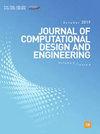Sine cosine algorithm with communication and quality enhancement: Performance design for engineering problems
IF 6.1
2区 工程技术
Q1 COMPUTER SCIENCE, INTERDISCIPLINARY APPLICATIONS
引用次数: 0
Abstract
In recent years, the Sine Cosine Algorithm (SCA) has become one of the popular swarm intelligence algorithms due to its simple and convenient structure. However, the standard SCA tends to fall into the local optimum when solving complex multimodal tasks, leading to unsatisfactory results. Therefore, this study presents the SCA with communication and quality enhancement, called CCEQSCA. The proposed algorithm includes two enhancement strategies: the communication and collaboration strategy (CC) and the quality enhancement strategy (EQ). In the proposed algorithm, CC strengthens the connection of SCA populations by guiding the search agents closer to the range of optimal solutions. EQ improves the quality of candidate solutions to enhance the exploitation of the algorithm. Furthermore, EQ can explore potential candidate solutions in other scopes, thus strengthening the ability of the algorithm to prevent trapping in the local optimum. To verify the capability of CCEQSCA, 30 functions from the IEEE CEC2017 are analyzed. The proposed algorithm is compared with 5 advanced original algorithms and 10 advanced variants. The outcomes indicate that it is dominant over other comparison algorithms in global optimization tasks. The work in this paper is also utilized to tackle three typical engineering design problems with excellent optimization capabilities. It has been experimentally demonstrated that CCEQSCA works as an effective tool to tackle real issues with constraints and complex search space.具有通信和质量增强的正弦余弦算法:工程问题的性能设计
近年来,正弦余弦算法(SCA)因其结构简单方便而成为流行的群体智能算法之一。然而,标准SCA在解决复杂的多模态任务时容易陷入局部最优,导致结果不理想。因此,本研究提出了具有通信和质量增强的SCA,称为CCEQSCA。该算法包括两种增强策略:通信与协作策略(CC)和质量增强策略(EQ)。在本文提出的算法中,CC通过引导搜索代理更接近最优解的范围来加强SCA种群之间的联系。EQ提高了候选解的质量,增强了算法的可开发性。此外,EQ可以在其他范围内探索潜在的候选解,从而增强了算法防止陷入局部最优的能力。为了验证CCEQSCA的能力,对IEEE CEC2017中的30个功能进行了分析。将该算法与5种先进的原始算法和10种先进的变体算法进行了比较。结果表明,该算法在全局优化任务中优于其他比较算法。本文的工作还用于解决三个典型的工程设计问题,具有出色的优化能力。实验证明,CCEQSCA是解决具有约束条件和复杂搜索空间的实际问题的有效工具。
本文章由计算机程序翻译,如有差异,请以英文原文为准。
求助全文
约1分钟内获得全文
求助全文
来源期刊

Journal of Computational Design and Engineering
Computer Science-Human-Computer Interaction
CiteScore
7.70
自引率
20.40%
发文量
125
期刊介绍:
Journal of Computational Design and Engineering is an international journal that aims to provide academia and industry with a venue for rapid publication of research papers reporting innovative computational methods and applications to achieve a major breakthrough, practical improvements, and bold new research directions within a wide range of design and engineering:
• Theory and its progress in computational advancement for design and engineering
• Development of computational framework to support large scale design and engineering
• Interaction issues among human, designed artifacts, and systems
• Knowledge-intensive technologies for intelligent and sustainable systems
• Emerging technology and convergence of technology fields presented with convincing design examples
• Educational issues for academia, practitioners, and future generation
• Proposal on new research directions as well as survey and retrospectives on mature field.
 求助内容:
求助内容: 应助结果提醒方式:
应助结果提醒方式:


